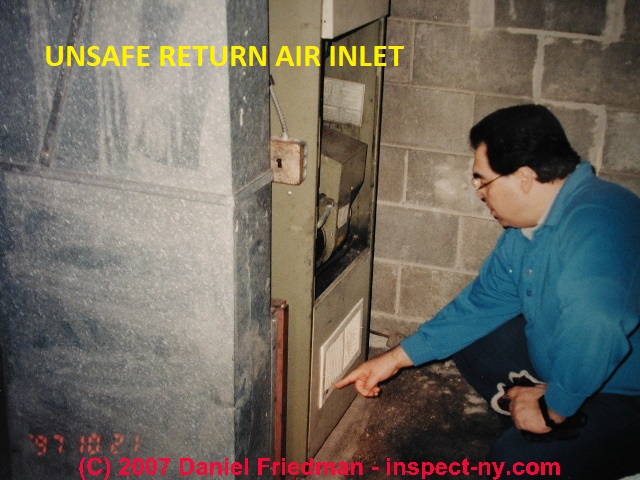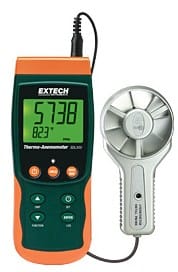 Air flow rate (CFM)
Measurement FAQs
Air flow rate (CFM)
Measurement FAQs
Q&A on tools, & air flow measurement
- POST a QUESTION or COMMENT about air flow rate or CFM measurement methods & typical rates in buildings and in HVAC systems
Air flow rate data & instruments: this article defines air flow rate or cubic feet per minute (CFM) as the term is used to describe building air conditioners, heating systems, or building air movement rates.
We describe the types of devices or instruments used to measure air flow, comparing the features, operation, and accuracy of each approach.
We include examples of manufacturer's air flow rate or CFM data for HVAC equipment like air conditioners and furnaces.
We also include a list of air flow rate measurement instrument or tool suppliers - where to buy CFM measurement equipment. Page top photo illustrates an example of a vane anemometer produced by Extech, the Extech ExTech SDL300 Anemometer and data logger - www.extech.com [permission requested 9/12/12]
InspectAPedia tolerates no conflicts of interest. We have no relationship with advertisers, products, or services discussed at this website.
- Daniel Friedman, Publisher/Editor/Author - See WHO ARE WE?
Definitions, Procedures & Tools for Measurements of Air Flow Rates (CFM) in Buildings

Questions & answers about measuring air flow rates in mechanical systems, air conditioners, heating systems, other air ducts, posted originally
at AIR FLOW MEASUREMENT CFM - topic home
Discussed in this article series: how to measure air movement or flow rates in buildings; how to measure HVAC duct supply or return air flow rates in CFM or by other standards. What tools to use to measure air flow rate, accuracy, procedures, & where to buy.
Definitions, Procedures & Tools for Measurements of Air Flow Rates (CFM) in Buildings.
Suitability of Dwyer Instruments FLST airflow rate monitoring equipment in a wood dust handling system
Dwyer Instruments FLST. Would this be something I could use in a negative air system carrying wood dust and flakes for constant monitoring?
On 2017-05-11 by David HowardReply by (mod)
Thanks for the question, David.
The short answer is maybe: there may be a problem with a requirement for frequent cleaning of the sensor system.Shown here, a round Dwyer Instruments FLST airflow monitoring device described in more detail below. Contact information for Dwyer and details about this instrument are
Measuring air flow in CFM versus return air inlet size
We had a baseboard return vent that was (vent opening) 6" x 29" by 1 inch. Of course the grate itself was a little larger. We were led to believe this was 300 cfm.
We needed an additional 300 cfm so this was replaced with an baseboard angled vent that is (vent opening) 6" x 29 , with the top 1" out from the wall, and the base board, on the floor section 3.5 " out from the wall.
Of course some floor board was cut to accommodate the additional approx 2.5 " on the floor. Does this really give us the additional cfm we need? Thank you , Lee M On 2016-02-27 by Lee M
by (mod)
Lee
The return air inlet size does not tell us the CFM or air speed delivered by the air handler. That's a function of the air handler's blower size and speed, impacted by duct design, constrictions, lengths, elbows, etc.
I'd ask your expert to look at the entire duct system for design defects, crimps, disconnections, leaks, before making further changes.
Search InspectApedia.com for RETURN AIR ADEQUACY for more information.
Use an anemometer for heating or air conditioning system duct airflow rates?
 Magkanu po Yung anemonerter na baka post? Tnx
Magkanu po Yung anemonerter na baka post? Tnx
Answer by (mod)
Rico
An anemometer is a wind velocity device used to measure outdoor windspeed. A conventional outdoor Anemometer ccould indeed be used to measure airspeeds in duct systems, as we discuss in response to a reader question at the end
of AIR FLOW MEASUREMENT CFM , but because of difficulties of duct access a conventional outdoor wind-speed anemometer is not really convenient for measuring air flow iside of a heating or air conditioning system.
Several companies including Dwyer Instruments address this with specific hand-held instruments:
Handheld anemometers are an excellent, portable tool for performing tests on HVAC system performance; however, large rotating vanes can prevent easy access to ducts.
Dwyer introduces the Model VT-200 Vane Thermo-Anemometer to eliminate this problem. Additionally, simple keypad programming enables the user to view volumetric flow rates in CFM or CMM.
Data logging software is also available to easily record and view data on a PC or laptop. - Retrieved 2016/03/21, original s: http://www.dwyer-inst.com/ApplicationGuides/?ID=30
How to measure airflow of a blower assembly before it is installed
We have a blower fix with 40kw, 400v, 50hz motor as spare now we wish to install.Before installation we would like to measure the blower total flow.
Tell me know how we can do it? On 2015-09-22 by Anonymous
Answer by (mod)
You cannot measure the air flow of a blower assembly if it is not running. You could calculate theoretical air movement out of the air handler by knowing the squirrel cage fan specifications in CFM it is rated to produce at a given RPM, then you'd need to reduce that by all of the frictional and constrictive losses in the duct system.
If the blower is running you can rent, buy, or borrow an air flow rate measurement instrument such as those cited in the article above.
Question: Calculate ventilation rate for a nail & spa salon
I'm doing a tenant fit-up for a nail and spa salon. How do I show/calculate the HVAC systems to provide ventilation of 15CFM/person as described in IEBC 709.2?
Thanks for your help in advance. (Feb 27, 2013) Sam Xu
In an HVAC system air duct I am examining there is a diffuser fitted which has air flowing in four direction.
So while measurintg four reading have to be taken and then average of four reading is ideal process or should we make an duct near diffuser and take a single reading? (June 23, 2014) NK Gandhi
Reply:
NK
Unless the duct configuration is quite asymmetric I'd expect the arriving air to hit uniformly on all four louvered sides of the diffuser, generating pretty much the same air flow at each outlet side. Why not make a few actual reading tests to confirm that the uniformity I predict is what you're finding?
On the other hand if an air duct takes a sharp 90deg. turn then connects to the diffuser very closely, the air flow may be non-uniform, in which case you've pointed out a potentially important source of variation.
If you find that's the case you might make a temporary adapter hood that is simply held in place over the diffuser to momentarily direct all air flow in a single direction to obtain an approximate reading of CFM.
Question: re: CFM needed for an 1800 sq.ft. room
If I have a room that is 1800 cubic feet, and want to have an effective HEPA/UV HVAC system, how many CFM is necessary? Does the total amount of air need to be through the filter every minute?
I guess what I'm asking, is will a 300 CFM system be good enough for a 1800 CF room to maintain dust/particle control? Or does it have to be 1800CFM to be a "Cleanroom"? (Sept 17, 2014) Matt said:
Reply:
I can't answer this question: to proceed we need to know the room's air leak rate, access doors, air exchange rate, etc.
...
Continue reading at AIR FLOW MEASUREMENT CFM or select a topic from the closely-related articles below, or see the complete ARTICLE INDEX.
Or see these
Recommended Articles
- AIR FLOW IMPROVEMENT, HVAC
- AIR FLOW MEASUREMENT CFM
- AIR FLOW RATES in HVAC SYSTEMS
- AIR FLOW TOO WEAK
- AIR LEAK NOISES
- AIR LEAKS in RETURN DUCTS
- AIR LEAKs in SUPPLY DUCTS
- BALANCING AIR DUCT FLOW
- BLOWER LEAKS, RUST & MOLD
- COOL AIR SUPPLY IMPROVEMENT
- DIRTY A/C BLOWERS
- DIRTY AIR FILTER PROBLEMS
- DIRTY COOLING COIL / EVAPORATOR COIL
- FROST BUILD-UP on AIR CONDITIONER COILS
- FURNACE OVERSIZE PROBLEMS
- INSULATION BLOCKED COOLING COIL
- LEAKY DUCT CONNECTIONS
- REGISTER & DUCT LOCATION
- RETURN AIR, INCREASE
- RETURN AIR REGISTERS & DUCTS - home
- SLAB DUCTWORK
- UNDERSIZED RETURN DUCTS
Suggested citation for this web page
AIR FLOW MEASUREMENT FAQs at InspectApedia.com - online encyclopedia of building & environmental inspection, testing, diagnosis, repair, & problem prevention advice.
Or see this
INDEX to RELATED ARTICLES: ARTICLE INDEX to HVAC DUCT SYSTEMS
Or use the SEARCH BOX found below to Ask a Question or Search InspectApedia
Ask a Question or Search InspectApedia
Try the search box just below, or if you prefer, post a question or comment in the Comments box below and we will respond promptly.
Search the InspectApedia website
Note: appearance of your Comment below may be delayed: if your comment contains an image, photograph, web link, or text that looks to the software as if it might be a web link, your posting will appear after it has been approved by a moderator. Apologies for the delay.
Only one image can be added per comment but you can post as many comments, and therefore images, as you like.
You will not receive a notification when a response to your question has been posted.
Please bookmark this page to make it easy for you to check back for our response.
IF above you see "Comment Form is loading comments..." then COMMENT BOX - countable.ca / bawkbox.com IS NOT WORKING.
In any case you are welcome to send an email directly to us at InspectApedia.com at editor@inspectApedia.com
We'll reply to you directly. Please help us help you by noting, in your email, the URL of the InspectApedia page where you wanted to comment.
Citations & References
In addition to any citations in the article above, a full list is available on request.
- In addition to citations & references found in this article, see the research citations given at the end of the related articles found at our suggested
CONTINUE READING or RECOMMENDED ARTICLES.
- Carson, Dunlop & Associates Ltd., 120 Carlton Street Suite 407, Toronto ON M5A 4K2. Tel: (416) 964-9415 1-800-268-7070 Email: info@carsondunlop.com. Alan Carson is a past president of ASHI, the American Society of Home Inspectors.
Thanks to Alan Carson and Bob Dunlop, for permission for InspectAPedia to use text excerpts from The HOME REFERENCE BOOK - the Encyclopedia of Homes and to use illustrations from The ILLUSTRATED HOME .
Carson Dunlop Associates provides extensive home inspection education and report writing material. In gratitude we provide links to tsome Carson Dunlop Associates products and services.

